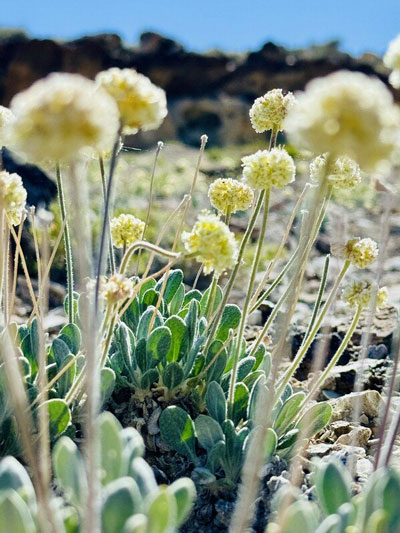October 28, 2024 – RENO, NV – The U.S. Bureau of Land Management gave final approval on Thursday to the Rhyolite Ridge Lithium-Boron Mine, despite severe threats the project poses to biodiversity, cultural landscapes and water.
Related: Department of the Interior Announces Major Lithium Mine Approved in Nevada in Latest Effort to Support a Domestic Supply of Critical Minerals - Rhyolite Ridge Lithium-Boron Mining Project Located in Southern Nevada’s Silver Peak Range
Scientists have said Rhyolite Ridge Mine would drive the rare wildflower Tiehm’s buckwheat to extinction, with the plant’s entire global population within the footprint of the mine. The project would also severely damage water sources and sacred sites in the Silver Peak Range, harming the cultural heritage of the Western Shoshone people.
“By greenlighting this mine the Bureau of Land Management is abandoning its duty to protect endangered species like Tiehm’s buckwheat and it’s making a mockery of the Endangered Species Act,” said Patrick Donnelly, Great Basin director at the Center for Biological Diversity. “We need lithium for the energy transition, but it can’t come with a price  tag of extinction.”
tag of extinction.”
(Pictured) Tiehm's buckwheat. Photo credit: Vanessa Barchfield, Center for Biological Diversity.
Tiehm’s buckwheat is a rare Nevada wildflower with delicate cream-colored blossoms that grows on just 10 acres of the boron- and lithium-rich soils of the Silver Peak Range in Esmeralda County. It is a linchpin of the local ecosystem and supports a highly diverse pollinator community.
As a result of the Center’s petition and subsequent lawsuits, the buckwheat was protected under the Endangered Species Act in 2022 and 910 acres surrounding the wildflowers were designated as critical habitat.
In June more than 100 scientists submitted a letter to the Bureau expressing concern that the mine would put Tiehm’s buckwheat “on a path to extinction.” The scientists said, “No mitigation measures will sufficiently address these impacts to appreciably reduce the risk of extinction.”
The mine threatens water sources in the Silver Peak Range. These springs and seeps are the lifeblood that sustain desert bighorn sheep and mule deer herds, which the Western Shoshone people have hunted for sustenance since time immemorial. Nearby Cave Spring, a cultural site with great historical significance including rock art, will also be threatened.
“The BLM no longer manages public lands, and instead it provides the means to destroy the environment and pollute water,” said Fermina Stevens, executive director of the Western Shoshone Defense Project. “By fast-tracking lithium projects, ignoring water scarcity, environmental impacts and the opposition of local communities and Indigenous peoples, we see how future projects will be implemented. The United States claims lying, cheating and manipulating their laws somehow gave them ownership of land that was never for sale when in fact they violated our human rights as stated by United Nations committees. For over 150 years the Western Shoshone people have been fighting for land and treaty rights and throwing pennies at us does not relieve the United States of their debt to the Western Shoshone people. All of Nevada belongs to Indigenous people. Our voices will be heard as we continue the fight for justice for the future of all beings of our earth mother.”
The BLM approved the mine despite its own staff describing the environmental review process as being on “a very aggressive schedule that deviates from other project schedules on similar projects,” according to emails obtained by the Center through the Freedom of Information Act.
The Center and Great Basin Resource Watch told the BLM about additional deficiencies with the mine plan regarding dust, pit wall stability, tailings dam integrity and hydrology. These deficiencies pose a substantial risk of mine infrastructure failure, which could cause water contamination and harm wildlife in the area.
“Given the destructive nature of mining, it is essential that the siting of mining operations be done carefully and judiciously,” said John Hadder, executive director of Great Basin Resource Watch. “However, the proposed Rhyolite Ridge mine is following the dangerous pattern set by the Thacker Pass lithium mine of fast and sloppy permitting, rolling back environmental standards, ignoring sound science, and disregarding concerns of directly affected communities — a serious loophole in the Lithium Loop concept.”
Litigation is now the only way stop the Rhyolite Ridge Mine from causing the extinction of Tiehm’s buckwheat, harm to cultural sites and resources, and destruction of water resources.
“The science is clear that this mine’s approval violates numerous environmental protection laws and it shouldn’t be moving forward,” said Donnelly. “We’ve been fighting to save Tiehm’s buckwheat for six years and we’re not giving up now.”
The Center for Biological Diversity is a national, nonprofit conservation organization with more than 1.7 million members and online activists dedicated to the protection of endangered species and wild places.
The Western Shoshone Defense Project’s mission is to affirm Newe (Western Shoshone) jurisdiction over Western Shoshone homelands by protecting, preserving, and restoring Newe rights and lands for present and future generations based on cultural and spiritual traditions.
Great Basin Resource Watch is a Nevada based nonprofit environmental justice organization that works with communities to protect their land, air, and water from the harmful affects of mining.
Source: Center for Biological Diversity








